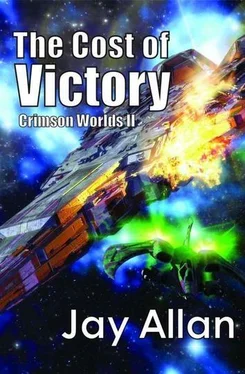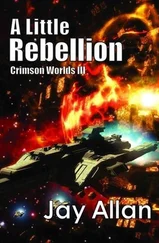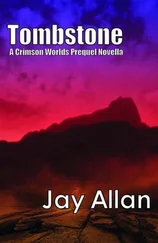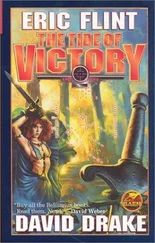Holm thought it might be a good idea for Erik to take a little vacation right about now anyway. Cain had become somewhat controversial. His situation with Captain Warren had deteriorated considerably since he’d had the outraged political officer escorted from the alien facility. Warren had twice disobeyed Cain’s orders to stay away from the cave, insisting that he was not in the regular marine chain of command and therefore not bound by such directives. The first time, Cain had yelled a bit and had him escorted back to camp. The second time, he’d come very close to summarily executing the political officer. While the military code technically gave Cain that right under combat conditions, it would have created a colossal mess. Anne Delacorte had likely saved Warren’s life that day, for which Holm had rewarded her with her major’s circlets.
Warren had filed a whole stack of complaints against Cain, but Erik was the hero of the Carson’s World campaign and revered in the Corps, so he’d probably be safe from any serious consequences. Still, General Samuels was on his way to Carson’s World to review the security arrangements for the cave, and Holm would be just as happy if Erik was off somewhere recreating with his beautiful doctor instead of here to face the number two officer in the Corps.
He wondered how long the peace would last. The CAC and Caliphate armed forces had been shattered, but they would rebuild…the question was how quickly. But regardless, peace couldn’t last now. The alien artifact was thousands of years ahead of any technology man had dreamed of, and once the other Powers found out about it the Alliance would likely have a choice – share the amazing discovery or fight everyone else to hold on to it. Cain didn’t kid himself about which choice Alliance Gov would make.
He knew the government would crack down on the colonies too, and he was just as sure the frontier worlds would resist. Alliance Gov had ruled over meek, terrified masses for far too long; they did not understand the spirit of people who’d left everything behind to tame new worlds. The early colonists had braved hostile environments, unknown pathogens, and the harshness of the untamed wild. They had starved, frozen, and fought for every day of survival. They considered the worlds they had built to be theirs, and they were not about to let them become copies of the grotesque society they had left behind.
When matters reached the breaking point he didn’t know what would happen, but he was pretty sure it would be messy. He hoped his fellow Marines would refuse to fire on colonists; he knew he would disobey such an order. His worst nightmare was that some of his comrades chose one side and some the other. He’d face any horror before that…before he was forced to pull the trigger on another Marine. But that was tomorrow’s problem, and he’d face it when it came.
He’d come a long way, and though it felt like he and Sarah were riding off into the sunset, he knew better. This was a temporary respite, a break in the storm. Worse trials lay ahead, of that he was sure. They would be sorely tested in the years to come, and while he mourned for the peaceful existence he knew was impossible, he was thankful for what he did have. If his life was to be filled with unending struggles, he was profoundly grateful to have found something worth fighting for…worth dying for if need be. There was a time he had fought just as hard for a crust of bread…or for nothing at all.
Cain looked toward the edge of the poured ‘plast landing area, fringed with the patchy yellow fungus that grew in the dry red dirt of Carson’s World. He saw her first in his peripheral vision, that familiar mane of reddish-blonde hair blowing in the gentle breeze – even redder on Carson’s World where everything seemed to pick up a crimson tint. She wore a set of gray fatigues, her shiny new platinum eagles on the collar.
Most of all, he would fight for her, for a universe where they could live together one day without the pain and death and blood. He would fight to keep her safe, to insure that she never went through the suffering and misery she had survived so many years before.
He had been reborn, just as the Corps had promised when it plucked him from the executioner’s chair. And he would keep fighting until they’d forged a universe where the price of rebirth wasn’t war and killing and blood. He wasn’t sure he believed it was possible, but he would keep fighting until he knew, however long it took.
The stellar forces of the Superpowers are called navies and the vessels ships, but war in space bears little resemblance to the millennia of sea battles Earth fleets have fought. Space is three dimensional for one thing, and this vastly complicates the tactics employed. Earthly concepts like north and south are wholly inadequate to describe the action when two star fleets engage.
Perhaps most alien to a terrestrial perspective is the lack of friction and strong gravity. On Earth, when a vessel ceases acceleration, it stops, not immediately perhaps but soon after. In space it keeps going at the same speed forever, unless it hits something or gets caught in the gravitational pull of a planet or other body. The implications of this are considerable and often counter-intuitive to the Earthbound mind. For a vessel to achieve a high speed, it must accelerate for a considerable period, building its velocity as is does. Ships, therefore, do not have a maximum speed, save for that of light, which is imposed by the laws of the universe. The maneuverability of a vessel is instead determined by the thrust it can generate to quickly alter its velocity or change its course.
The thrust a ship can generate and employ is limited to the capacity of its reactors and engines. The ability of a ship's crew to endure the G forces caused by extreme acceleration is another limiting factor. Though crews wear pressure suits and vessels employ couches and tanks and various other devices to increase the amount of force a ship's crew can sustain, human endurance is the primary factor limiting acceleration rates on modern ships.
Because of these constraints, a ship may need to accelerate for days, or even weeks, to achieve a very high velocity, requiring the same amount of time to decelerate.
Velocity actually impairs maneuverability in many ways, since the available thrust is generally sufficient to make only moderate changes to a ship's trajectory in a short period. Thus, in some ways, projecting target areas for fast-moving ships is often easier than for ones traveling at lesser speeds, as the slower vessels are capable of more pronounced and sudden changes of direction. For this reason, fast-moving ships are highly susceptible to well-placed minefields, either already in place, or dropped by enemy vessels moving across the paths of the target ships (assuming that the intercepting ships can maneuver themselves accordingly).
A vessel moving at high speed is also limited to a brief window when it is close to its target, and then must spend hours, and sometimes days or weeks, decelerating to turn and re-engage. Physical weapons systems are subject to the same realities as the ships themselves. Fast-moving ships can very effectively launch a quick attack on a stationary target like a space station or planet, but they need to plot a course more or less straight at the objective and fire their full salvoes at the optimum point. Once they pass the target, attacks with missiles and other physical weapons quickly become impractical. The missiles have the same initial velocity and vector as the launching platform, so once a vessel has passed its target at high speed, it becomes very difficult for ordnance to exert sufficient thrust to decelerate then reaccelerate back toward the target in a reasonable time period.
Читать дальше












